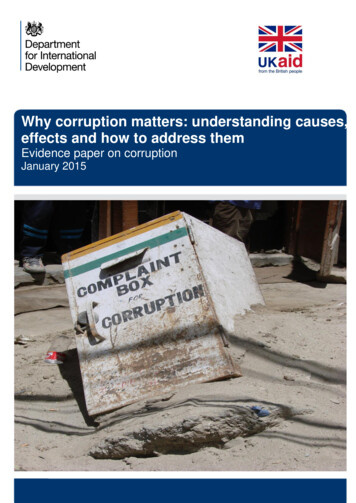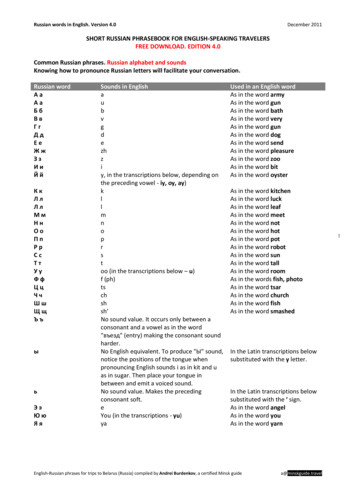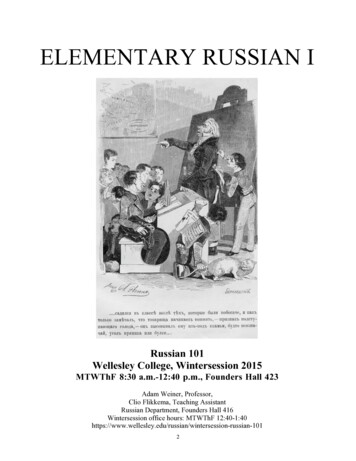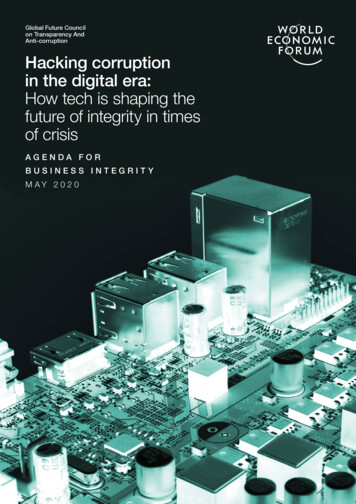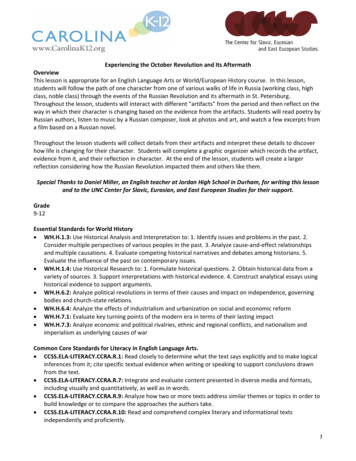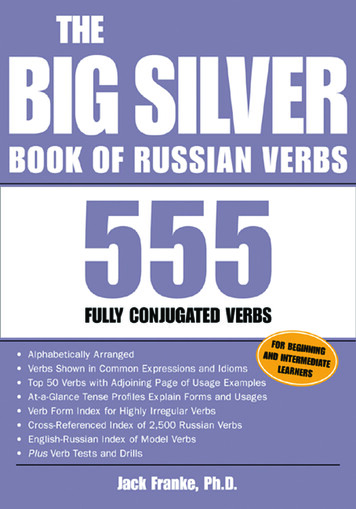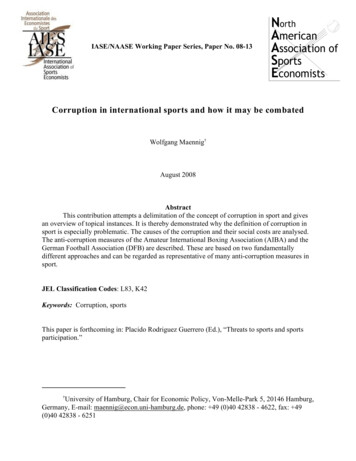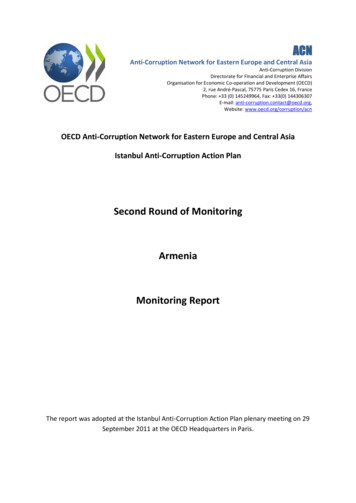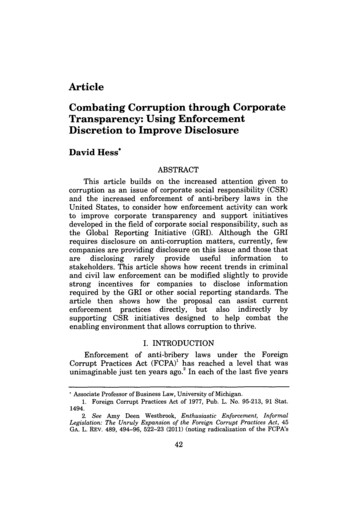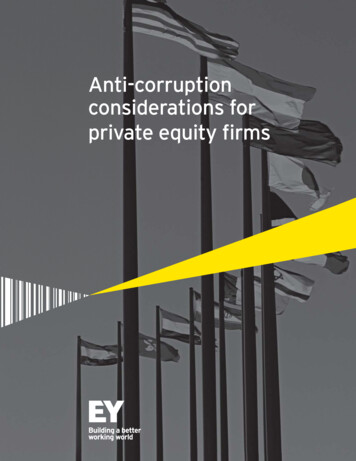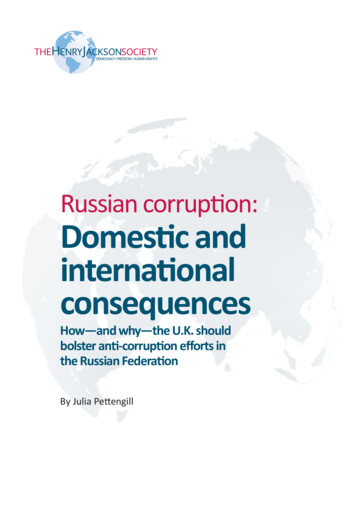
Transcription
Russian corruption:Domestic andinternationalconsequencesHow—and why—the U.K. shouldbolster anti-corruption efforts inthe Russian FederationBy Julia Pettengill
First published in 2013 by The Henry Jackson SocietyThe Henry Jackson Society8th Floor – Parker Tower,43-49 Parker Street,London, WC2B 5PSTel: 020 7340 4520www.henryjacksonsociety.org The Henry Jackson Society, 2013All rights reservedThe views expressed in this publication are those of the author and are not necessarilyindicative of those of The Henry Jackson Society or its directorsDesigned by Genium, www.geniumcreative.comISBN 978-1-909035-06-52
About The Henry Jackson SocietyThe Henry Jackson Society: A cross-partisan, British think-tank.Our founders and supporters are united by a common interest in fosteringa strong British, European and American commitment towards freedom,liberty, constitutional democracy, human rights, governmental andinstitutional reform and a robust foreign, security and defence policy andtransatlantic alliance.The Henry Jackson Society is a company limited by guarantee registeredin England and Wales under company number 07465741 and a charityregistered in England and Wales under registered charity number 1140489.For more information about Henry Jackson Society activities, our researchprogramme and public events please see www.henryjacksonsociety.org.3
Russian corruption: Domestic and international UTIVE SUMMARY8INTRODUCTION11CHAPTER 1 – CORRUPTION IN RUSSIA: RECENT HISTORY13Anti-Corruption activities in Russian civil society17The government’s anti-corruption drive:Potemkin politics or serious initiative?18FACT BOX: The Serdyukov Case20Corruption and human rights in Russia: Two case studies22Mikhail Khodorkovsky and the Yukos case:“The world’s biggest threat is corruption, not nuclear weapons”22Sergei Magnitsky: Silencing the whistle-blower24Sergei Magnitsky’s death: International impact25CHAPTER 2 – RUSSIAN CORRUPTION: A DOMESTICAND INTERNATIONAL PROBLEM28The U.K. regulatory landscape: Russia and the exportation of corruption30Why should the U.K. worry about Russia?32CHAPTER 3 – RECOMMENDATIONS35Improved domestic enforcement35Enhanced public scrutiny36A U.K. version of the “Sergei Magnitsky Rule of Law Accountability Act”37Support for Russian civil society40Improved international co-operation on anti-corruption efforts41CONCLUSION42ENDNOTES444
Russian corruption: Domestic and international consequencesForeword by Dominic Raab MPThis report provides a timely reminder of the unique challenges facing Russia, acountry burdened with endemic corruption at a critical stage of its economic andpolitical development. It contains stark analysis regarding both the nature and thescale of this criminality – illustrated by the estimated 211.5 billion of illicit capitalthat left Russia between 1994 and 2011.As the author explains, these crimes are not solely economic in dimension. Thereare victims who pay a higher price, such as Sergei Magnitsky, the whistle-blowinglawyer who exposed a massive fraud perpetrated by a combination of state officialsand organised crime. Through the connivance of those same officials and others, hewas falsely arrested and then tortured in prison, where he eventually died after ayear in detention.This corruption is not a tragedy for the Russian people alone. The rest of the worldsuffers from its spill-over effects, through the drug trade, human trafficking, fraudand organised crime. Corruption in Russia inflicts damage and suffering on thestreets of Britain.It is unacceptable that the perpetrators are free to come to Britain, buy property andtreat this country as a haven. As the report points out, Russian millionaires accountedfor a quarter of the Tier-1 UK visas issued last year. Whilst most of these individualswill have earned their money legitimately, this report makes a powerful case forgreater UK transparency (over who is coming to this country) and more robust lawenforcement. It also strengthens the case for the enactment of a Sergei MagnitskyAct equivalent to the law passed in the United States in 2012, which would imposemandatory visa bans and asset freezes on those responsible for human rights abusesand cover-ups, wherever they are perpetrated.Russia is a difficult partner, posing opportunities and presenting risks. We needto persevere in pursuing bilateral cooperation on issues from security to energy.However, in doing so we should not turn a blind eye to the tainting effect of corruptionand other mafia criminality. If we do, these problems – and their internationalconsequences – will only grow.Dominic RaabMP for Esher and WaltonMarch 20135
Russian corruption: Domestic and international consequencesAbout the Russia Studies CentreThe Russia Studies Centre is a research and advocacy unit operating within theHenry Jackson Society. It is dedicated to analysing contemporary Russian politicaldevelopments and promoting human rights and political liberty in the RussianFederation.AcknowledgementsThe author would like to thank Simon Williams; Vladimir Temerko; and NicolaeReutoi for their research assistance on this report, and Vladimir Ashurkov; MarkGaleotti; Dominic Raab MP; and Lilia Shevtsova for their participation in originalinterviews for this report.6
Russian corruption:Domestic andinternationalconsequencesHow—and why—the U.K. shouldbolster anti-corruption efforts inthe Russian FederationBy Julia Pettengillwww.henryjacksonsociety.orgThis paper is written in the author’s personal capacity and the views expressed are the author’s alone7
Russian corruption: Domestic and international consequencesEXECUTIVE SUMMARY The Russian Federation has made tremendous strides since theeconomic chaos of the post-Soviet 1990s. However, the countryremains plagued by endemic corruption, suffusing a system in whichthe boundaries between the public and private sector are blurred. This phenomenon has also gone hand-in-hand with the erosionof democratic development and return of authoritarianism underVladimir Putin. It is used as a means of cementing the loyaltyof the political elite, and flourishes in the absence of judicialindependence and government transparency. According to polls, corruption is one of the foremost causes ofdissatisfaction amongst the Russian public, and was one of theissues which inspired the mass protests of 2011-2012. Anticorruption activism by individuals such as Alexey Navalny hashighlighted the potential for this issue to be used as an impetusfor political reform. While the Russian government has integrated international anticorruption standards into its domestic legislation, those measuresare selectively enforced, usually against political opponents. Thegovernment’s most recent anti-corruption measures are unlikelyto prove successful, as they do not address the need for systemicreforms such as the introduction of political competition, judicialindependence and breaking the government monopoly on themedia. Corruption in Russia is often tied, both directly and indirectly, tohuman rights abuses, by entrenching disrespect for individual8
Russian corruption: Domestic and international consequencesrights in the political system. The case of the billionaire politicalprisoner, Mikhail Khodorkovsky, and the wrongful imprisonmentand death of the whistleblower attorney Sergei Magnitsky aptlydemonstrate this connection. Russian corruption undermines the economic prospects, civilliberties and fundamental dignity of the Russian population.However, the scale of this domestic problem also has significantramifications in a globalised economy, as funds obtained throughcorruption are laundered and circulated throughout the world—often finding homes in global financial-centres such as London.Corrupt business practices exported into the international marketundermine the stability and integrity of the international financialsystem. The United Kingdom has one of the most sophisticatedanti-corruption regulatory structures in the world, and isinternationally respected for its judicial independence. However,the enforcement of these regulations, particularly by banks andby agencies charged with oversight of the importation of fundstied to corruption, has consistently been criticised as insufficientby the Financial Services Authority (F.S.A.) and other bodies. The significant presence of Russian wealth and immigrants in theU.K. is a positive development. However, the likelihood of corruptpractices having been responsible for some Russian wealthshould inform the assessment of funds brought into the countryfrom Russia, as well as from other countries with reputations forcorruption. Improved domestic enforcement is crucial to any effort by theU.K. to bolster anti-corruption efforts abroad. Banks shouldbe subjected to increased pressure to engage in more rigorousassessments of risk in relation to funds from Russia and othercorrupt countries. Additionally, investment in the Serious FraudOffice should be increased. The U.K. Parliament should undertake measures to enhancepublic scrutiny of corruption, including pushing forward libelreform. The current libel law regime aids those whose wealth isobtained through corruption by providing them with a significant9
Russian corruption: Domestic and international consequencesweapon with which to forestall investigations and silence publiccriticism of their activities. Parliament should pass a U.K. version of the Sergei Magnitsky Ruleof Law Accountability Act, which was signed into law in the UnitedStates in December 2012, and imposes visa bans and asset freezeson the individuals implicated in the imprisonment and death ofMagnitsky, as well as any other Russian citizen credibly suspectedof human rights abuses. If the U.K. passed a similar measure, thiswould have direct consequences for the individuals who engagein rights abuses, often for personal benefit via corrupt practices,and chip away at the incentives for participating in this system. The British government should increase its engagement withrepresentative of Russia’s embattled, but burgeoning, civilsociety. This should extend to high-level meetings with ministersin the Foreign and Commonwealth Office (F.C.O.), as well asengagement with parliamentary forums such as relevant All-PartyParliamentary Groups (A.P.P.G.s). The U.K. should robustly promote an anti-corruption agenda ininternational forums. In particular, the U.K. should use its G8presidency this year to push for measurable benchmarks forRussia to undertake economic and political reforms relevant to agenuine systemic anti-corruption campaign.10
Russian corruption: Domestic and international consequencesINTRODUCTIONIn the past decade, the Russian Federation has emerged as one of theworld’s most promising economies, rising from post-Soviet economic chaosto year-on-year growth, even in the aftermath of the global financial crisis.Yet the country remains in the thrall of endemic corruption—a phenomenonwhich has undermined Russia’s political and economic development, andthreatens to cause long-term stagnation or even crisis.According to the Transparency International “2012 Corruption PerceptionsIndex”, Russia ranks among the most corrupt developed countries in theworld—133rd out of 176 countries surveyed, with the worst offenders atthe bottom of the list.1 According to Sergei Ignatyev, head of the CentralBank, this has cost the country 49 billion in capital flight in 2012 alone.2In the West, corruption in Russia is often treated as a fact as unchangeableas the Russian winter—an assessment that is all-too-often informed by apatronising perception of the country as somehow naturally incompatiblewith building a law-abiding society. Others prefer to conveniently ignore theproblems created by this endemic corruption, on the grounds of self-interest,rationalising that the money to be made from the energy and commoditiessectors far outweighs the long-term economic; legal; or moral elements ofthis problem.To view corruption as merely a problem for Russians is not only cynical, butalso short-sighted. Ignoring this phenomenon enables the continuation ofa system in which theft is not the exception, but the rule. In a globalisedeconomy, and with the United Kingdom still struggling towards recovery,endemic corruption in one of the world’s rising economic powers is aproblem for the system as a whole, distorting competition and underminingthe integrity of the financial sector.11
Russian corruption: Domestic and international consequencesWhile billions may be stolen in the Russian Federation, it does not usuallyremain in the country; it is swiftly transported through shell companiesand accounts around the world, laundered in offshore entities as well asEuropean Union countries such as Cyprus and Latvia, and legitimisedthrough purchasing assets in global financial-centres such as London. Suchfunds can be rapidly put towards the purchase of reputational legitimacyvia the financial and legal services of that country, or even the exercise ofpolitical influence.This report explores the significance of Russian corruption, with particularemphasis on its impact and influence in the U.K. This is not to suggestthat Russia is the only exporter of corruption with whom the U.K. shouldbe concerned, as anti-corruption actions should clearly be universal innature. The intent of this report is simply to highlight the fact that, given thesignificant amount of capital transferred to the U.K. from Russia, there is goodreason for the U.K. to invest in fighting against the exportation of corruption,and to support efforts by Russian civil society to achieve meaningful reform.Such an effort has the potential not only to help the U.K. avoid the pitfallsassociated with the injection of dirty money into the British economy, it canalso perform a vital role in supporting efforts to reform Russia’s economyand contribute to the fight against global corruption.12
Russian corruption: Domestic and international consequencesCHAPTER 1CORRUPTION IN RUSSIA: RECENT HISTORYSince the collapse of the Soviet Union, corruption has been one of the mostpervasive and damaging problems afflicting the Russian Federation. AsRussia transitioned from an authoritarian state with a centralised economyto a capitalist democracy, the breakdown of institutions made the countryparticularly vulnerable to corrupt activities. The lack of any meaningfullustration of the state security forces enabled the perpetrators of humanrights abuses to obtain positions of power and wealth in the post-Sovietera. Furthermore, the uncontrolled shift of wealth into a market economy;the uncertainty and missteps of the new political order; and the lack of ameaningful rule of law combined to embed corruption in the D.N.A. of thenew political order.The failure of institution-building, along with lax international scrutiny,severely distorted the process of privatisation in the immediate post-Sovietperiod, enabling a small group of businessmen—the oligarchs—to gaincontrol of the commanding heights of the economy, as well as an enormousamount of political influence. One of the most significant examples of thefusion of political and economic corruption in the post-Soviet state wasthe infamous “loans-for-shares” arrangement of 1995-1996. Under thisarrangement, Russia’s most powerful oligarchs lent money to the state as apretext to recoup the loans through the purchase of shares in state-ownedcompanies, at a price equal to thirty per cent of the difference between themarket value of the shares and the amount lent to the government.Throughout the 1990s, Western loans to Russia were funnelled into corruptactivities, and deposited in Swiss bank accounts. The extent of this practicewas revealed in scandals, such as the infamous Bank of New York affair, in13
Russian corruption: Domestic and international consequenceswhich it was discovered that millions of dollars were being laundered throughthat bank throughout the 1990s.3 The easy availability of Western funds wasalso used to shore up the political position of the shambolic President, BorisYeltsin, and his inner circle—known as “The Family.”4Striking socioeconomic inequality reigned: by the time Boris Yeltsin left officein 1999, ten per cent of the population owned half of Russia’s wealth, andcontrolled much of the country’s political life.5 During this chaotic period,organised crime and business became intimately associated, with businessdisputes regularly settled through violence: in 1994, fifty bankers wereassassinated in Moscow alone.6Although pervasive corruption has plagued Russia since the Tsarist period,the mismanagement of the post-communist transition laid the basis for there-emergence of authoritarianism under Vladimir Putin, and the marriage ofpublic and private sector corruption under his personal authority. In his firstpresidential campaign in 2000, Putin ran against the lawlessness; conspicuousgreed; and disproportionate political influence of the oligarchs—a popularstance to take in a country disgusted by the theft, excesses, and economicchaos of the 1990s. However, Putin quickly demonstrated that his intentionwas not to challenge this culture of corruption, but merely to bring it underthe more centralised control of the state. “Like Yeltsin, Putin adoptedcorruption as a key element of his rule,” explained Russia specialist MarkGaleotti. “It’s how he co-opts people into the system, and gives him acarrot and a stick to use against the elite.”7 On 28 July 2000, Putin invitedRussia’s most significant oligarchs to a meeting at the Kremlin, in which hecommunicated that they would be permitted to keep their wealth, providedthat they committed to paying their taxes and staying out of politics. 8 Thosewho were unwilling to accede to this arrangement—notably, VladimirGusinsky, Boris Berezovsky, and Mikhail Khodorkovsky—found themselvesthe subjects of criminal investigations, and saw their companies seized bythe state and purchased by loyal Putin allies such as Roman Abramovich andOleg Deripaska.9Putin cemented his power base by installing loyalists from his time in boththe St Petersburg mayoral office and the K.G.B. at the heart of government,and using the United Russia Party to dominate and transform the parliamentinto a “rubber stamp” authority. This new elite became known as the siloviki,or “strongmen”, and have been the enforcers and beneficiaries of the fusionof public- and private-sector corruption ever since. While the state andsociety contain numerous groups participating in corruption, the siloviki14
Russian corruption: Domestic and international consequencesare unique in their ability to wield power over the commanding heights ofthe economy, and to affect change through state-owned companies; the taxservice; the security services; and the courts.10Even at the local and regional level, politicians from, or allied to, the UnitedRussia Party are found to have relatives with no prior commercial experiencemysteriously entrusted with the running of hugely profitable enterprises,and civil servants on small salaries can be found to have sizeable assets,including expensive cars and property abroad. Analysts estimate Putin’sown net worth to be up to 40 billion—despite an official annual salaryand military pension amounting to around 148,000—11 which he hasbeen accused of amassing through illicit means.12 “What we have in Russiais the merger of power and property,” commented Lilia Shevtsova, SeniorAssociate at the Carnegie Moscow Centre. “The men who rule Russia ownRussia. They don’t even need to bribe officials because they are the officials!So the key problem is how to divide this power, which is the basis for furthertransformation.”13At the highest level, there is the political and economic corruption of graft;fraud; embezzlement; and kickback schemes generated through accessto public funds. Government procurement contracts and infrastructureprojects are among the most lucrative opportunities for corruption, withan estimated loss of 32 billion per year through procurement alone.14According to opposition politician and anti-corruption activist VladimirAshurkov, “[o]ne example we found at RosPil [Alexey Navalny’s anticorruption blog] was the practice of substituting Cyrillic letters on bids forgovernment procurement with Latin letters which look the same, so that,when the information is published on the Internet, the search terms don’tappear, limiting the competition so that you can make sure the tender is wonby a particular company.”15Massive corruption and the further deterioration of the rule of law havegone hand-in-hand with the steady erosion of democracy and humanrights in Russia. While Dmitry Medvedev’s presidency of 2008-2012 raisedhopes among some Russians that genuine reforms might be underway, hispromises to tackle corruption and “legal nihilism” proved largely insincere—as was his presidency (revealed in 2011 to have been a mere placeholder forthe return of Vladimir Putin for a third term). The widespread electoral frauddisplayed during the Duma elections of December 2011 was barely able todeliver a parliamentary majority to United Russia—partly a consequence ofthe party’s widespread unpopularity and association with corruption. Putin15
Russian corruption: Domestic and international consequenceswas re-elected in March 2012 with a convincing, but diminished, majority.The election was also marred by fraud, and was characterised by an overallabsence of genuine political competition.Corruption is the glue that holds together an unwieldy, vertically integratedsystem of power through elaborate, mostly unofficial, patronage. Thisphenomenon extends from the most senior officials and political allies withinstate-owned oil and gas companies like Gazprom and Rosneft, to the lowerlevel officials soliciting bribes to process permits for small business-owners.According to the “2011 Bribe Payers Index”, the country scores 6.1 on a scaleof 10, with the majority of respondents believing police and public officialsto be the institutions most affected by corruption.16 Political and economiccorruption feed off one another, but perhaps the most significant elementenabling the proliferation of both is Russia’s lack of judicial independence:in 2012, the country scored 6 out of 10 in Freedom House’s “2012 JudicialFramework and Independence Assessment.”17Corruption acts as a double or triple tax on the Russian economy: firstthrough theft; secondly, by depriving the state of tax revenue; and, in mostcases, a third tax by leaving the country to be deposited in foreign countries.Thus far, the country’s economic health has been bolstered by the highprice of oil and gas; yet there are increasing signs that the consequences ofcorruption could contribute to economic stagnation, or even crisis.The overreliance on a largely state-controlled energy sector has left theeconomy vulnerable to future challenges, and struggling to diversify. Thelack of competition within that sector, and the losses and inefficienciesbred by corruption, have left Russia particularly vulnerable to increasedcompetition and any decline in the price of oil and gas. For example, whilestate-owned Gazprom has been the Leviathan of Europe’s energy marketfor the past decade, it is increasingly under threat—with an anti-trustinvestigation underway by the European Union, and an estimated 70 percent value lost annually through corruption or waste, including billions spenton unnecessary pipelines.18Political and economic corruption in Russia is thus deeply intertwinedand mutually reinforcing, endangering the economy and underminingthe country’s political development. Popular challenges to corruption areundermined by the lack of respect for individual rights, making corruptionboth an enforcer of political passivity and a galvanising issue for Russia’sburgeoning civil society.16
Russian corruption: Domestic and international consequencesANTI-CORRUPTION ACTIVITIES IN RUSSIAN CIVIL SOCIETYPolitical and economic corruption has emerged as one of the chiefdissatisfactions of the Russian public, with 41 per cent of respondents in aNovember 2012 Levada Centre poll believing that corruption has increasedover the past decade.19 The identification of United Russia with corruption isso significant that it has become popularly known as the “party of crooks andthieves”—a term coined by anti-corruption activist and opposition leaderAlexey Navalny, and one of the rallying slogans of the 2011-2012 protestmovement.Navalny’s anti-corruption website, RosPil, has been instrumental inuncovering cases of corruption implicating members of Russia’s politicaland business elite, using novel investigative tactics—including the purchaseof minority shares in state-run companies in order to draw attention tocorrupt practices, and soliciting tip-offs from whistle-blowers. High-profilecases revealed by Navalny include allegations that Deputy Prime MinisterIgor Shuvalov benefitted from oligarch Alisher Usmanov’s purchase of Britishsteel company Corus Group (explored in a joint publication with the RussiaStudies Centre),20 and allegations of 4-billion fraud during the constructionof the 4,857-kilometre East Siberia-Pacific Ocean pipeline in 2006 by theTransneft oil-transport company.21Navalny’s transformation into an internationally famous opposition leaderhas demonstrated the potential of corruption to become an impetus forpolitical reform. As a consequence, Navalny is currently the subject of severalcriminal investigations accusing him of corruption—a Soviet-era tactic ofattributing the crimes revealed by the whistle-blower to the whistle-blowerhimself. Among other allegations, Navalny has been accused of coercingthe Kirovles timber company into entering into a loss-making deal;22 ofdefrauding an unnamed firm out of 1.8 million in shipping charges;23 and,most recently, of stealing 3.3 million in funds from the now-defunct Unionof Right Forces political party.24Navalny’s associates have also been targeted. On 7 February, VladimirAshurkov’s home was searched in connection to the latter probe; investigatorsseized documents, electronic equipment, and reportedly denied Ashurkovaccess to legal representation.25 Nikita Belykh, the liberal governor of theKirov region, has been accused of stealing 3 million in state property;subjected to a no-confidence vote by Kremlin proxies within the regionalgovernment; and has also been questioned in relation to the investigation17
Russian corruption: Domestic and international consequencesinto Alexey Navalny.26 Fellow oppositionists Leonid Gozman, Boris Nemtsov,and Maria Gaidar have also been questioned in relation to this alleged theft,in what is widely seen to be a pretext for the harassment of key members ofthe Russian opposition.27Following Navalny’s strategy, Russia’s protest movement has increasinglyfocused on anti-corruption efforts. Eduard Mochalov, a farmer-turnedmuckraking journalist based in the province of Chuvashia, publishes amonthly free newspaper called Vzyatka (The Bribe) detailing the activitiesof the corrupt officials who steal from Chuvashia’s regional coffers, and hasbeen cited by Navalny as a promising example of grassroots activism.28 Otheropposition leaders, including Boris Nemtsov and Vladimir Milov, have alsocampaigned for transparency and the reform of the corrupt nexus betweenthe state and private sectors in Putin’s Russia.Anti-corruption activists face numerous challenges, including a culturalenvironment of political passivity in which corruption is accepted by manyas the price of doing business. “Anti-corruption is a growing sentiment, butit is still controversial in traditional locations where it is an easy way to solveproblems,” explained Lilia Shevtsova. “You pay a bribe to the officials, tothe police, to the school to get your kid into kindergarten. It can help thelocal population to quickly solve some of their problems, but the level ofcorruption is becoming so global, it’s everyone’s problem now.”29While corruption is consistently shown to be the issue most capable ofarousing public anger in Russia, widespread political passivity and theweakness of civil society have made it difficult for anti-corruption activists totranslate these sentiments into a sustained campaign for reform. However,corruption has clearly been identified as a threat to the stability of thecurrent regime, which is currently engaged in an attempt to neutralise thepolitical potency of this issue.THE GOVERNMENT’S ANTI-CORRUPTION DRIVE:POTEMKIN POLITICS OR SERIOUS INITIATIVE?The Russian government is not oblivious to the economic and politicalchallenges posed by corruption, which is one of the reasons why it haslaunched a public campaign to reduce corruption. In light of the worseningauthoritarianism in Russia, and the country’s record of paying lip service tointernational standards without meaningful enforcement, the substance ofthese initiatives is doubtful.18
Russian corruption: Domestic and international consequencesIn the past, anti-corruption measures such as anti-money-launderingregulations (A.M.L.) have been adopted in reaction to widespreadinternational pressure, but they are rarely—or only selectively—enforced.Russian A.M.L. legislation makes reference to the Financial Action Task Force(F.A.T.F.) “Forty Recommendations”, and the “Wolfsberg Principles” (theindustry-drafted standards for oversight and best practice) are recognisedby the Russian banking community.30 Despite incorporating these measuresinto Russian law, Russia’s judicial system does not tend to prosecute cases ofprofessional money-laundering involving organised crime. While this couldbe attributed to a lack of resources to detect complex money-launderingschemes, the Russian law enforcement’s objectivity and incentives in relationto these matters is questionable.31 Instead, anti-corruptio
problems created by this endemic corruption, on the grounds of self-interest, rationalising that the money to be made from the energy and commodities sectors far outweighs the long-term economic; legal; or moral elements of this problem. To view corruption as merely a problem for Russians is not only cynical, but also short-sighted.
